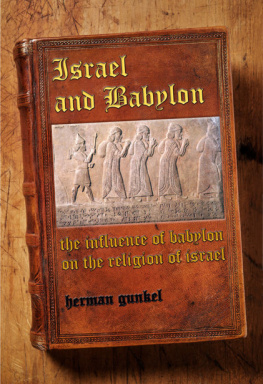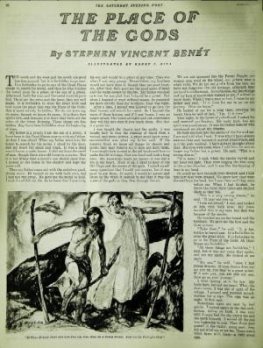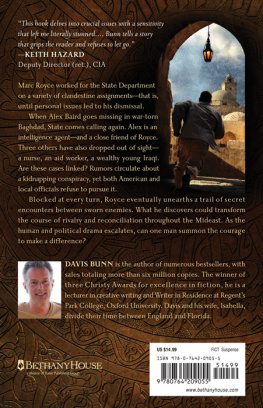Hermann Gunkel - Israel and Babylon : the influence of Babylon on the religion of Israel (a reply to Delitzsch)
Here you can read online Hermann Gunkel - Israel and Babylon : the influence of Babylon on the religion of Israel (a reply to Delitzsch) full text of the book (entire story) in english for free. Download pdf and epub, get meaning, cover and reviews about this ebook. City: Philadelphia, year: 1904, publisher: John Jos. McVey, genre: Religion. Description of the work, (preface) as well as reviews are available. Best literature library LitArk.com created for fans of good reading and offers a wide selection of genres:
Romance novel
Science fiction
Adventure
Detective
Science
History
Home and family
Prose
Art
Politics
Computer
Non-fiction
Religion
Business
Children
Humor
Choose a favorite category and find really read worthwhile books. Enjoy immersion in the world of imagination, feel the emotions of the characters or learn something new for yourself, make an fascinating discovery.
- Book:Israel and Babylon : the influence of Babylon on the religion of Israel (a reply to Delitzsch)
- Author:
- Publisher:John Jos. McVey
- Genre:
- Year:1904
- City:Philadelphia
- Rating:5 / 5
- Favourites:Add to favourites
- Your mark:
- 100
- 1
- 2
- 3
- 4
- 5
Israel and Babylon : the influence of Babylon on the religion of Israel (a reply to Delitzsch): summary, description and annotation
We offer to read an annotation, description, summary or preface (depends on what the author of the book "Israel and Babylon : the influence of Babylon on the religion of Israel (a reply to Delitzsch)" wrote himself). If you haven't found the necessary information about the book — write in the comments, we will try to find it.
Hermann Gunkel: author's other books
Who wrote Israel and Babylon : the influence of Babylon on the religion of Israel (a reply to Delitzsch)? Find out the surname, the name of the author of the book and a list of all author's works by series.
Israel and Babylon : the influence of Babylon on the religion of Israel (a reply to Delitzsch) — read online for free the complete book (whole text) full work
Below is the text of the book, divided by pages. System saving the place of the last page read, allows you to conveniently read the book "Israel and Babylon : the influence of Babylon on the religion of Israel (a reply to Delitzsch)" online for free, without having to search again every time where you left off. Put a bookmark, and you can go to the page where you finished reading at any time.
Font size:
Interval:
Bookmark:
Israel AndBabylon
THE INFLUENCEOF BABYLON ON THE RELIGION OF ISRAEL
[A Reply ToDelitzsch]
BY
Herman Gunkel,d. d.
ASSISTANT PROFESSOR OF OLD TESTAMENT THEOLOGY IN THEUNIVERSITY OF BERLIN
Forpresenting to the English-speaking public this translation an explanation isscarcely necessary. Since the days of Ferdinand Christian Baur no theologicalcontroversy has so agitated Germany as has this present question as to therelation between the Old Testament and the traditions of Babylon. Opened onJanuary 13th, 1902, by the now famous lecture before the Emperor, the strugglehas raged and is raging yet with a fury of almost unparalleled violence. Theliterature on the subject has become so voluminous as to form almost a libraryin itself. Prof. Delitzsch cites some twenty titles in the appendix to thesecond edition of his first lecture but these are but a modicum of the whole.
In one regard especially the presentsituation may be paralleled with the Baur controversy. Nearly every person whocould contrive to print or to have printed his views on the subject has done soand, in consequence, by far the greater part of the pamphlets and articles thathave appeared display a lack of proper informationnot to say, learning.That a reply should be in some measure as well informed as the attack is aprinciple that has been disregarded in too many instances, and such a disregardmerely assists in weakening the cause defended.
None the less, many scientists andtheologians of note have appeared on both sides, such names as Budde, Jensen,Knig, Jeremias, Hommel and Kittel are a sufficient evidence of that fact. Buteven much of their contribution to the discussion has been irrelevant, and muchenergy has been wasted fruitlessly in attempting to overthrow Delitzsch on hisown ground. As an Assyriologist his work can scarcely be questioned. The properquestion is: Do his results in Assyriological study form a sufficient basis forhis conclusions in theology? Not that this has been overlooked by any meanscf.Budde, especiallybut the need was felt for a thorough scientist who should beat once a master of the Babylonian legends and a theologian of the first rank.
For this reason the work of Prof. Gunkelappears most opportunely. Probably no one is better qualified to speak withauthority on the matters involved. In his work Schpfung und Chaos (1895) hedisplayed a most perfect acquaintance with the theology and legends ofBabylonia and his critical handling of the material was such as to mark anepoch in the study of this subject. In 1900 he published the first edition (2ndin 1902) of his commentary on Genesis (in the Nowack series), which, beyond allquestion, is now the authoritative work on this book. His mastery of Babylonianmythology and its influence on the religion of the Old Testament needs nofurther demonstration than that afforded by this work.
In making the present translation twopoints have been borne in mind. In the first place it has been made to conformto the original as closely as possible. Hence what is to our eyes an unusuallylavish use of italics and exclamation points. The long paragraphs have beeninterfered with but little, but occasionally it has been necessary to splitsome sentence into two or three. In the second place, remembering that theresults of the higher criticism are not very familiar to most persons in thiscountry, many notes have been inserted (in square brackets) to explainreferences known usually to the expert alone.
The name Yahw (Jehovah) has beenrepresented usually by J, following a common custom in England. Allquotations from Delitzsch have been made to correspond to the Englishtranslation of Mr. Johns as closely as possible, even when Gunkel differs inslight details from the original. Biblical quotations are given in the form ofthe Authorized Version.
For the sake of those wishing to pursuethe matter further it may be added that the Code of Hammurabi has beentranslated by Mr. Johns under the title The Oldest Code of Laws in the Worldand forms a very inexpensive volume. The El-Armarna Tablets have been publishedin English (besides other more elaborate editions) by Lieut.-Col. Conder in apopular form. A sufficient guide to the literature on the Babel and Biblecontroversy will be found in the Expository Times for the last twoyearsmore at length as regards special monographs in the other theologicalreviews.
Aword or two may not be out of place respecting Mr. Johns introduction to histranslation of Babel und Bibel . In the Expository Timesfor October of the present year he says (p. 44): When I wrote theintroduction, I tried to avoid giving any indication of my own views on thepoints raised by Prof. Delitzsch. If Mr. Johns own views are hostile to Prof.Delitzsch, he assuredly has met with unqualified success, for a moreappreciative introduction it rarely has been my lot to read. It is the duty ofthe student who claims to be neutral not merely to content himself withexpatiating on the excellencies of the work before him but to use at least someendeavor to point out possible weaknesses. This Mr. Johns has made not theleast attempt to do and the most casual reading of his introduction willdispose of the plea purely objective. Every virtue of Babelund Bible has been indicated, et voil tout .
On p. xxvi, we read: If these lecturesare to be answered the Professor must be met on his own ground. That isperfectly true if an answer to the purely scientific problem of the reading andknowledge of tablets is meant. But the controversy was not aroused by readingtablets. The question is: Do the results of Assyriological science destroy thepossibility of a unique revelation in the Old Testament? That is what thecontroversy is about and there Prof. Delitzsch is on anything but his ownground. If a total disregard of the principles used in studying the history ofreligion, if a complete ignorance of anything but the broadest outlines of OldTestament criticism, coupled with a blunder in quoting the New Testament that aGerman school-boy should be ashamed to make, prove anything, they certainlyprove that in theology, Prof. Delitzsch is most emphatically not on hisown ground. He has placed himself in a domain where he is not at home, with theresults to be expected. LaPlace was a most wondrous mathematician, but hiscareer as a politician is memorable. Prof. Delitzsch is perhaps the foremost ofAssyriologists. Let us hope he will not try to be anything else.
The Translator.
For something over a year the German public has beenset in commotion over the theme Babel and Bible. How are we to explain thesensation that the lectures, of Delitzsch have called forth? This is a questionthat certainly demands consideration. For, in the first place, that firstlecture, from which the agitation of the public took its start, offers nothing,as far as regards its scientific material, but what was known generally to allAssyriologists and to all students of Old Testament theology as wella factthat is granted on all sides. In other words, the lecture was, and evidentlyclaimed to be, only a fuller and more perspicuous review of the presentresults. In order to explain the sensation which so suddenly arose, it isnecessary to remember the conditions under which our public writers exist. Thedaily press lives in its own manner from day to day on events. A developmentthat goes on slowly and quietly escapes notice easily, but if a sudden andfortuitous occurrence brings matters to the surface, then the events become allat once events and remain so until something else more eventful suppressesthem. So it has happened that our newspapers had taken small notice of thequiet but greatly growing science of Assyriology, in much the same way astheyto their disgrace be it saidhave studied to ignore scientific theology ingeneral (albeit that there are a few noteworthy exceptions, particularly oflate). Whatever can be read in the daily papers on such things (and especiallyon Old Testament subjects) is usually of the smallest scientific value. And thisis not excused by the fact that many educated persons, including those of thehighest circlesaye, even many University teachers (as is evident from time totime)men with whom we teach from day to day and from room to roomthat evensuch as these know nothing of the existence of an earnest scientific theology;have no conceptions of the method of our work, and are ignorant of the resultsof that work despite all our endeavors to popularize them. And with thisuniversal ignorance of the
Next pageFont size:
Interval:
Bookmark:
Similar books «Israel and Babylon : the influence of Babylon on the religion of Israel (a reply to Delitzsch)»
Look at similar books to Israel and Babylon : the influence of Babylon on the religion of Israel (a reply to Delitzsch). We have selected literature similar in name and meaning in the hope of providing readers with more options to find new, interesting, not yet read works.
Discussion, reviews of the book Israel and Babylon : the influence of Babylon on the religion of Israel (a reply to Delitzsch) and just readers' own opinions. Leave your comments, write what you think about the work, its meaning or the main characters. Specify what exactly you liked and what you didn't like, and why you think so.








